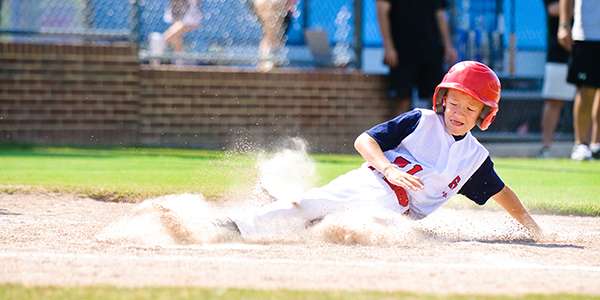Helping Young Athletes Boost Resilience
Summary: Mental Toughness is a critical trait that helps young athletes bounce back from losses, injuries, and other challenges. Parents and coaches play a key role in fostering resilience by modeling problem-solving skills, encouraging creative solutions, and guiding kids to reflect on their experiences. Focusing on the big picture after setbacks helps athletes understand that losses are part of the learning process, not the end of their journey.
Resilience is an important trait for all athletes in sports. It helps them bounce back after losses, injuries and other types of adversity, says psychologist and former sports mom Kathryn Den Houter, author of “Resilience: A Workbook: Powering Through Adversity to Find Happiness.”
To help boost athletes’ mental toughness, parents should focus on problem solving, she told us during an Ultimate Sports Parent podcast interview. They should model problem solving and encourage it in their sports kids.
“Good problem solvers are the ones who are resilient. Encourage creative problem solving,” she advises. To nurture problem solving, coaches and parents can help athletes brainstorm. Some kids–and parents–are better at this than others, but they can train themselves to brainstorm and problem solve. If parents are problem solvers, it’s likely their children will also demonstrate this trait.
“Sometimes parents want things to go a certain way and if they don’t, they get overwrought. Others say, ‘This is our new reality, how do I problem solve it?’”
Another way to be resilient is to look at the big picture, especially after a loss, says Den Houter.
“It’s about bouncing back, realizing it’s not the end of the world, we win some and lose some. Kids should look at a larger part of their lives.” Encouraging kids to reflect on their experiences is another important way to boost resilience.
“Sometimes kids are very good at performance, but the language piece needs to be emphasized by parents. They need to talk through the frustrations they feel and share what’s on their minds,” says Den Houter.
Again, parents can be role models and talk through their own frustrations. They can also praise kids for being reflective.
“The key is to keep learning from losses and launching better strategies. That’s what will have an effect. Being reflective is such an important part of resilience,” she says.
Listen to the entire interview on Resilience with Houter below:
4 Tips to Help Athletes Build Resilience in Sports
1. Encourage Creative Problem-Solving
Resilient athletes are strong problem-solvers. Parents and coaches can nurture resilience in youth sports by helping kids brainstorm solutions when challenges arise. Teaching athletes to think creatively under pressure allows them to adapt and bounce back after setbacks.
2. Focus on the Big Picture After Losses
Remind young athletes that one loss or mistake is not the end of the world. Resilience in sports comes from seeing the bigger picture—recognizing that wins and losses are part of the journey and learning from every experience.
3. Promote Reflection and Open Communication
Athletes strengthen resilience when they reflect on their performance and express their emotions. Parents can support this by encouraging open conversations about frustrations, setbacks, and successes, helping kids process challenges in a healthy way.
4. Model Resilience as Parents and Coaches
Young athletes learn resilience by watching how adults handle adversity. Parents and coaches who stay calm, problem-solve, and reflect on their own challenges provide powerful role models for athletes, teaching them how to stay positive and persistent.
Related Sports Psychology Articles
- Mental Training for Young Athletes
- Why Parents Need to Support Their Kids’ Mental Game
- How Sports Parents Can Identify and Nurture their Kids’ Individual Mental-Game Strengths
*Subscribe to The Ultimate Sports Parent Podcast
*Subscribe to Peak Performance Sports on Youtube
Download a free sports psychology report to improve your mental game!
The Confident Sports Kid

When kids lack confidence, they doubt themselves, stop taking risks, play tentatively, and are hard on themselves. As a result, kids often lose their motivation to improve. Ultimately, these barriers keep them from enjoying sports and making the most of their physical talent.
“The Confident Sports Kid” program is actually two programs: one that teaches sports parents how to boost their kids’ confidence, and another that teaches young athletes age 8 to 18 how to improve their self talk, avoid negative thinking, overcome expectations that limit confidence, and much more. The program will help kids boost their confidence in sports and life…and enjoy sports more.
FAQ: How to Boost Resilience in Young Athletes
Q: What is resilience in young athletes?
A: Resilience in young athletes is the ability to bounce back from losses, injuries, or challenges, maintaining confidence, focus, and motivation to continue improving.
Q: How can parents help boost mental toughness in their sports kids?
A: Parents can boost resilience in young athletes by modeling problem-solving skills, encouraging reflection after setbacks, and praising creative solutions and perseverance.
Q: Why is problem-solving important for building resilience?
A: Problem-solving helps young athletes see challenges as opportunities, learn from mistakes, and develop the mental toughness needed to overcome adversity.
Q: How does reflection enhance resilience in sports kids?
A: Reflecting on experiences after competitions or setbacks helps athletes understand what worked, identify areas to improve, and create better strategies for future success.
Q: Can looking at the big picture improve resilience?
A: Yes, encouraging athletes to see the bigger picture after a loss helps them understand that setbacks are temporary and part of the learning and growth process.
Q: How do positive role models affect a child’s mental toughness?
A: When parents or coaches demonstrate calm problem-solving and perseverance, young athletes learn to handle challenges positively, which strengthens their own resilience.
Kids Sports Psychology expert Patrick Cohn, Ph.D. has helped athletes for over 35 years to enhance their performance. Dr. Cohn earned a master’s degree in sports psychology from CSUF and a Ph.D. from the University of Virginia, specializing in Applied Sports Psychology. Today, he is the president and founder of Peak Performance Sports, LLC in Orlando, Florida.


Fantastic thank you! Could you point me in the right direction for even more information please. I am safe guarding and the mum of a player of the local team. They play excellent on the training but struggle in matches. I am looking at building their confidence and being a psychologist student myself I am interested in learning more to support them.
The best option is our MGCP Certification program for coaches.